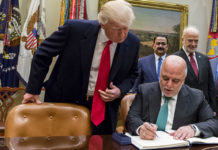In an iconic scene from the 1980s comedy classic “The Blues Brothers,” Jake (John Belushi) and his brother Elwood (Dan Aykroyd) are being chased by the police when Elwood attempts to allay Jake’s fears by asserting, “They’re not gonna catch us . . . we’re on a mission from God.” Today’s real-life Democrats believe themselves to be on a similar quest; one they claim is essential to “save democracy.” And, like Elwood, they believe they will not (cannot?) be caught before the mission is complete.
For the sake of our nation, they must be proved wrong.
It remains unclear exactly from whom, or from what, Democrats want to save democracy. Nevertheless, and perhaps just by coincidence, this crusade has been the Party’s obsession since being shocked by Hillary Clinton’s 2016 defeat. Curiously ignoring the fact that this same democratic process was working fine when electing Barack Obama in 2008 and 2012, Democrats now are convinced the system is completely broken, and have assumed for themselves the responsibility to repair it in advance of the 2020 elections.
One such fix, H.R. 1 — the “For the People Act” — was approved by the House Administration Committee last week, setting up a likely floor vote later this month. The bill comes with much ballyhoo from Democrats, and contains numerous election “reforms” long coveted by liberals; including, for starters, automatic voter registration and expanded early voting.
There are other insidious measures lurking within the legislation’s pages. The bill includes provisions carefully crafted to undermine the 2010 Supreme Court’s Citizens United decision, which was a major victory for free political expression during election cycles. In a gut punch to nonprofit organizations’ ability to engage in election-cycle issue advocacy, H. R. 1 would force disclosure of contributors’ names; thereby significantly chilling free speech.
A coalition letter organized by FreedomWorks in opposition to H.R. 1 (signed by me among many others) outlines other serious issues with the bill, including an expansion of the definition of “political coordination” that would severely restrict political advocacy; a reorganization of the Federal Election Commission to make it more partisan in nature; and several provisions significantly extending the arm of federal government control into state and local elections.
The degree to which H.R. 1 would “federalize” state and local elections should come as no surprise to those who have witnessed the Democrats’ contempt for President Trump and the GOP reach a fever pitch. Ever since Clinton’s loss in 2016, the Left has been engaged in an all-out war to turn America’s system of government on its head in order to grab from Republicans as much power as possible.
Calls for an end to the electoral college have gone from a largely-forgotten liberal talking point to one championed (but still misunderstood) by high-level Democrats, including former Attorney General Eric Holder, who labeled the electoral college “undemocratic” and “a vestige of the past.”
Liberals also have expressed contempt for equal state representation in the U. S. Senate, especially following the 2018 election; prompting even the liberal-leaning Washington Post to remind Democrats the “Senate popular vote” did not actually exist. This, however, did not stop Sara Jeong, an ultra-liberal member of the New York Times’ editorial board, from recently bemoaning on social media “how the state of [W]yoming has two senators and a total population smaller than [P]ortland, [O]regon.”
Such disdain for a republican form of government so presciently designed by our Founders to protect minorities from the majority, belies the true intent of H.R. 1. Despite their tiresome moralizing, Democrats’ support for “direct democracy” in presidential elections is merely a means to the end; wherein the balance of power in our country is shifted to high concentrations of liberals clustered in major cities across America, with the means to more tightly control and dictate public policy for everyone else.
It is understandable why Democrats use the term “for the people” to describe their scheme, rather than the far more accurate, “control the people.” The camouflaged nature of their effort, however, makes it all the more important for us to understand that this legislative effort is but one instrument among many being employed by the Left with which to federalize public debate and policy. For example, despite declaring themselves “for the people,” Democrats have not hesitated to enlist unelected federal judges in their effort; through mechanisms such as nationwide judicial injunctions to thwart administration actions with which they disagree.
So it is with today’s Democratic Party, which cannot bring itself to declare what it stands for but does not hesitate to impose its will on “the people.”





























